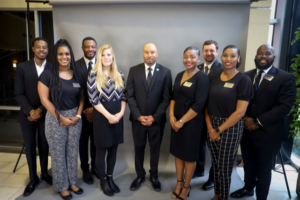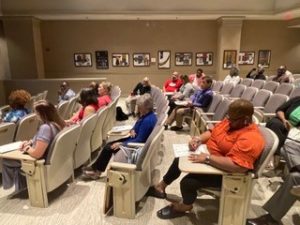News & Updates — Grantee Spotlight
Grantee Spotlight: Training Clergy to Recognize and Respond to Substance Misuse
December 19, 2022The nonprofit Agency for Substance Abuse Prevention (ASAP) in Oxford, Alabama, was founded 50 years ago to provide prevention training and tools to schools and community-based organizations. In 2022, with funding from FORE, ASAP developed a new curriculum to help faith-based leaders identify and respond to the challenges their congregants face with substance misuse. More than 100 faith-based leaders from different denominations across Alabama have taken part in the training so far, earning a faith-based support specialist certification from the Alabama Department of Mental Health, which helped develop the curriculum. The training has proven so popular ASAP is gearing up to offer it to clergy in eight southeastern states. We spoke to Rev. Byron Jackson, an ambassador for the program, and Seyram Selase, ASAP’s executive director, about the initiative and the results so far.
 The team at ASAP is offering training to faith leaders across Alabama. Next year, they’ll reach clergy in 7 additional states. Seyram Selase (center), ASAP’s executive director, and Rev. Byron Jackson (far right) head up the effort.
The team at ASAP is offering training to faith leaders across Alabama. Next year, they’ll reach clergy in 7 additional states. Seyram Selase (center), ASAP’s executive director, and Rev. Byron Jackson (far right) head up the effort.
Where did the idea of creating a certification program for faith-based support specialists come from?
Jackson: We wanted to bridge the gap between the faith-based community and mental health field and remove the stigma surrounding mental illness because we know one of the first places people will go for help, particularly in the Deep South, is the church. And yet, so many of us, including myself, enter the field with no training on how to recognize substance use disorders or respond effectively. We wanted to equip clergy from all denominations with the tools, skills, and resources they need to effectively minister to congregants.
What does the training cover?
Jackson: It’s a two-day, 16-hour program that covers emerging trends in substance use, the various levels of treatment and recovery supports that are available, and how to engage in effective communication around substance misuse by understanding trauma and avoiding stigmatizing language. We bring in speakers from the Alabama Department of Mental Health as well as representatives of treatment and recovery organizations in local communities so participants can see there are a lot of people who can help them navigate a complex system. At the end of the training, participants receive certificates that must be renewed every two years.
What sort of feedback have you gotten from people who have gone through the program?
Jackson: It’s been overwhelmingly positive. People post photos of their certificates on social media and testimonials about how the training changed them. The most startling thing for me is how many people will blurt out “I just didn’t know. Nobody taught me about this in seminary.” People also tell us they are flabbergasted to learn about all the resources — many free — that are available in their own communities, including certified peer recovery specialists who can support parishioners. We have had people from prevention and recovery organizations give out their cell phone numbers and say to the faith leaders, “If you know someone in crisis, call me.”
What kinds of impact is the program having?
Selase: We know from pre- and post-surveys that people’s knowledge of substance use disorders and treatment options improves dramatically. We’ll also be tallying how many congregants they’ve referred for treatment. One attendee told us in two months, she had already counseled and referred four people to treatment. We’ve also seen partnerships develop among clergy after they go through a tabletop exercise that encourages them to think through a community-wide response to a common problem related to substance misuse. We put Catholics and Baptists and Episcopalians and Methodists together to think through a problem. Seeing people of different ages and races come together, you see silos begin to break down as people realize they are dealing with similar challenges, including gun violence and domestic violence. It gives me hope that other solutions may come from this process.

What have you found to be effective in combatting stigma?
Jackson: Hearing directly from people who are in recovery themselves. In the last three trainings, there has been at least one clergyperson who stood up and stated they were in recovery. They walk, and talk, and dress just like everyone else. Despite this, some attendees are taken aback. That’s the stigma. As the training progresses, you can see a shift in people. Their posture changes and there’s more humility. I remember one pastor who proudly announced on the first day that he had never had a problem abusing substances. On the second day, he told the group, “I was wrong to say that. I know I am blessed to never have had this struggle but now I realize it can happen to anybody.” I have also had people tell me afterwards, “I had no idea. I believed my church was where it should be, but we don’t even have space for people struggling with substances.” I think about that a lot. How many people sit in our pews, how many members of our leadership, and even our staff may be quietly struggling and can’t say anything because our policies and even our contracts don’t allow them to ask for support?
On a recent FORE webinar where you described the program, several attendees said they wanted to see a similar program in their states. What are your plans for spreading the model?
Selase: In concert with the Substance Abuse and Mental Health Services Administration (SAMHSA), we’re planning a training for clergy in Alabama, Florida, Georgia, Kentucky, Mississippi, North Carolina, South Carolina, and Tennessee next year. Assuming SAMHSA approves the curriculum, we hope to offer the training in other regions and states as well. We also plan to make the training materials freely available. We don’t want to hoard it for ourselves. We just want to make sure it spreads in a way that encourages all denominations to participate. It’s designed for faith leaders from all religions.
Do you have any advice for people developing these programs on how to recruit clergy to these events?
Jackson: Face-to-face appeals with the message that prayer, prevention, and treatment work together make a big difference. People are so busy they often don’t have time to respond to emails or flyers. But they respond enthusiastically when they hear about it from a peer. We’ve had people drive from one end of the state to the other to attend because someone who participated said you can’t miss this and you should not wait.